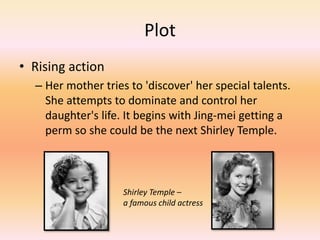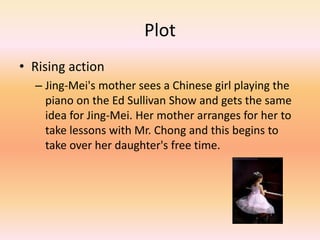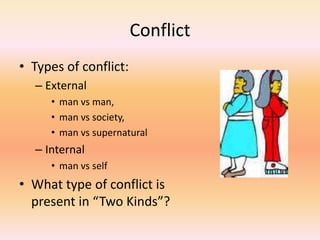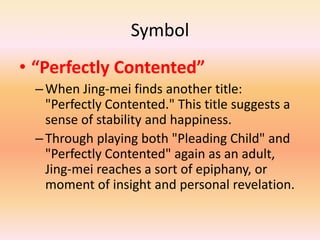Two Kinds by Amy Tan
- 1. Short Story
- 2. Background of Author: Amy Tan • Born: 19.02.1952 Oakland, California • Occupation: Writer • Nationality: American • Notable Work: The Joy Luck Club (novel)
- 3. Personal Life of Amy Tan • Tan is the second of three children born to Chinese immigrants Daisy (née Li) and John Tan, an electrical engineer and Baptist minister. • When Tan was 15 years old, her older brother Peter and father both died of brain tumors. • Daisy moved Amy and her younger brother John Jr. to Switzerland, where Amy finished high school. During this period, Amy learned about her mother's former marriage to an abusive man in Shanghai, China, and of their four children, including three daughters and a son who died as a toddler.
- 4. Personal Life of the Amy Tan • Tan received her bachelor's and master's degrees in English and linguistics from San José State University, and later did doctoral linguistics studies at UC Santa Cruz and UC Berkeley. • She resides in Sausalito, California, with her husband, Louis DeMattei, a tax attorney whom she met on a blind date and married in 1974. their children are Bubba and Lilli.
- 5. Quiz Short Story: Two Kinds 1. What city is the setting? 2. What does the mother think of America? 3. What does the mother wants her daughter to be? 4. What did the mother lose in China? 5. What was the first kind of prodigy the mother wanted the daughter to be? 6. Does the daughter like this? Why? 7. What kind of job does the mother have? 8. In your opinion, do you think “predicting the daily temperatures in Los Angeles” is a realistic expectation? 9. What happens when the girl doesn’t meet her mother’s expectations? 10. Why does the girl start counting the bellows?
- 6. Quiz Short Story: Two Kinds 11. What does the mother see on the Ed Sullivan show that mesmerizes her? 12. How does the mother pay for the piano lessons? 13. What is the name of the piano teacher? 14. Why did he retire from teaching piano? 15. What kind of piano player does the daughter become? Why? 16. Who is Auntie Lindo? 17. What piece of music does Jing-mei play for her recital? 18. What does Jing-mei say that finally end the piano lessons? 19. What gift does Jing-mei’s parent offer her at the end of the story? 20. What was the two piece of music she plays at the end of the story?
- 7. Synopsis • In this story, the narrator, Jing-mei, a Chinese-American girl whose mother believes that by living in America anyone can be anything they want to be, and so is determined to find hidden talent in her daughter. Jing-mei is repeatedly tested to reveal any kind of talent • However, she resists her overbearing mother’s desire to make her into a musical prodigy in order to compete with one of her friend’s daughters. She continually disappoints not only her mother, but herself as well and becomes determined not to try to have any talent at all.
- 8. Setting • San Francisco • The story is about a young girl’s coming of age in a family that has recently emigrated from China to America
- 9. Point of View • First person • From the point of view of an adult looking back on her own childhood experiences. • This gives the story a rich double perspective, allowing both the hindsight and judgment of a mature woman and also the freshness and innocence of a young person trying to discover her own identity.
- 10. Tone • Humour – We see the humor in the story right from the first page when Jing Mei tells us her mother wants her daughter to become "a Chinese Shirley Temple," (an allusion) as Jing-mei says."We'd watch Shirley's old movies on TV as if they were training films,“ – Her mother's knowledge comes mainly from TV and the magazines she finds in the homes of people whose house she cleans. "Reader's Digest", "Ripley's Believe It or Not", and "Good Housekeeping", though very popular, are not usually regarded as having any serious content.
- 11. Tone • Humour – Note how inept each of Jing Mei's teachers are: the beautician has unsteady hands and can't cut hair properly and Old Mr. Chong, her supposed music teacher, is actually deaf. – The chances that Jing Mei really have of succeeding in becoming a prodigy with such inept teachers are slim. This is a bit pathetic, but also funny. – In the early stages of her attempts to fulfill her mother's hopes for her, Jing Mei imagines herself as Peter Pan, a ballerina, Cinderella, and even the Christ child.
- 12. Tone • Angry – “It felt like worms and toads and slimy things crawling out of my chest, but it also felt good, as if this awful side of me had surfaced, at last.” – The "worms and toads and slimy things" crawling out from Jing-mei's chest symbolize the anger and other dark, negative feelings that have been penned up deep inside her until this moment.
- 13. Tone • Regret – Despite Jing Mei and her mother’s differences, her mother only wanted her to use the capability she knew she had. Jing-mei’s story tells us that she regrets not trying to do her best and how she had taken her mother for granted.
- 14. Types of Characters • Round Character: Jing-mei (a character who has a complex personality) – Headstrong (purposefully practices wrong notes) but wants to be loved (surprised when the recital goes poorly) • Flat Character: Old Chong (a character with one kind of personality) – Deaf and strange, old teacher who does not hear • Stock Character: Waverly (a conventional or stereotypical character) – Jing-mei’s nemesis
- 15. Protagonist & Antagonist • Protagonist: Jing-mei – She undergoes the main conflict, she desires to be loved for herself but she rebels against her mother • Antagonist: Jing-mei’s mother – She is unrealistic and tries to live vicariously through her daughter
- 16. Indirect Characterisation • “I began to cry.” – The action suggests her dissatisfaction with herself and her mother. • “You look like Negro Chinese…” – While the comment is directly characterising Jing-mei, the comment itself speaks to the abrasive, insensitivity of the mother.
- 17. Direct Characterisation • “I looked at my reflection, blinking so that I cold see more clearly. The girl staring back at me was angry, powerful.” – After being pushed by her mother to become a prodigy, she develops a rebellious attitude toward her mother. This leads her to stubbornness and hardness. • “Mr. Chong, whom I secretly nicknamed Old Chong, was very strange, always tapping his fingers to the silent music of an invisible orchestra. – Mr Chong is a strange man who has a certain characteristic.
- 18. Plot • Exposition – The story begins by explaining that Jing-mei's family moved to America when she was a baby, in 1949. Her mother is clear in her goals: she wants Jing-mei to be a child prodigy (a person with exceptional talent) and famous.
- 19. Plot • Rising action – Her mother tries to 'discover' her special talents. She attempts to dominate and control her daughter's life. It begins with Jing-mei getting a perm so she could be the next Shirley Temple. Shirley Temple – a famous child actress
- 20. Plot • Rising action – Then, Jing-Mei's mother presents her with many tests from stories of amazing children. The test include: knowing the capitals of states, multiplying numbers in her head, finding the queen of hearts in a deck of cards, trying to stand on her head without using her hands, predicting the daily temperatures in cities, and looking at a page from the Bible for three minutes to see what she remembers.
- 21. Plot • Rising action – Jing-Mei's mother sees a Chinese girl playing the piano on the Ed Sullivan Show and gets the same idea for Jing-Mei. Her mother arranges for her to take lessons with Mr. Chong and this begins to take over her daughter's free time.
- 22. Plot • Rising action – Her mother's determination is further sparked by a couple of scenes involving 'Auntie Lindo". Auntie Lindo is very proud of her daughter's chess playing skills, and brags of all of Waverly's trophies. During one conversation Jing-mei's mother stretches the truth a little in competition, and claims Jing-mei is talented with the gift of music. At this point Jing-mei says: "And right then, I was determined to put a stop to her foolish pride".
- 23. Plot • Climax : Jing-mei’s humiliation at her own piano recital. – Her mother is so proud of Jing-mei's musical talent; she even invites Auntie Lindo and Waverly to her first piano recital. Although Jing-mei slacked on her practicing, she actually feels confident about doing well at the recital. She is overconfident, in fact, and her performance was a disaster. – She disappoints her mother, and makes a fool of her. It is also clear that she has disappointed herself, and she regrets not taking lessons more seriously.
- 24. Plot • Climax – The next day, Jing-mei's stubborn mother expects her to practice piano, as if nothing has gone wrong. This is when she puts her foot down and refuses. To get her mother to back off, she tells her mother that she wished she were dead. – After Jing-mei hurts her mother, her mother finally gives up on her being a prodigy.
- 25. Plot • Falling action – Jing-mei never did the best she could at anything, just to spite her mother. Deep inside, she did have some pride in her piano-when her mother tells her that the piano is hers, and she should take it.
- 26. Plot • Resolution – Jing-mei’s mother has recently passed away. She has the piano tuned, and sits down to play. – She plays two songs. The first is entitled "Pleading Child", and the second one: "Perfectly Contented". These are songs that she had played when she was a child. She notices for the first time, after all of these years, that these two songs are actually two halves to the same song.
- 27. Conflict • Types of conflict: – External • man vs man, • man vs society, • man vs supernatural – Internal • man vs self • What type of conflict is present in “Two Kinds”?
- 28. Conflict • External Conflict – The battle of the daughter to either fulfill or deny the expectations of her mother, who wants her to be some kind of child prodigy so she can brag about her to her friends. (man vs man) – Jing-mei struggles to find her place in both the Chinese and American cultures. (man vs society) • Internal Conflict – Jing-mei has internal conflicts because she fears she will never be special, and she worries about how her mother feels about her. (man vs self)
- 29. Title: Two Kinds • What is the significance of the title? “Only two kinds of daughters…Those who are obedient and those who follow their own mind! Only one kind of daughter can live in this house. Obedient daughter!”
- 30. Title: Two Kinds The title illustrates NOT the two kinds of daughters – These words from Jing-mei’s mother show there are two kinds of people: the one the mother wants her to be and the one Jing-mei strives to be. – The story's title, "Two Kinds," refers to the story's central concern with the mother and daughter as two different kinds of people, yet members of the same family, and the same cultural heritage.
- 31. Themes 1. Obedience – Jing Mei did not understand the truth or meaning behind that declaration until after her mother’s death. Jing Mei realized that her mother only meant that she could be an obedient child by listening to her mother while at the same time follow her own heart and want her own prodigy in life.
- 32. Themes 2. Miscommunication – Miscommunication between immigrant parents and their American-born children. – Sometimes this takes the form of a parent doing something, or deciding something out of love for the child which the child, in turn, regards as oppressive. – Sometimes language itself becomes the problem. The parents generally retain their first language (in this case, Chinese) and English, for them, is ESL.
- 33. Themes 3. Growing Up – Only after her childish cruelty and after growing up and growing apart from the family and her mother does Jing-mei realize how much influence her mother has really had on her life. – She recognizes herself to be not so separate from her mother after all. – Perhaps she also realizes life for everyone resembles the life her mother led; one part of loss and failure, another part of growth and hope.
- 34. Themes 4. Making Choices • Jing-Mei quickly begins to lose interest in her mother's dream of being a prodigy and becomes stubborn. "I won't let her change, I promised myself. I won't be what I'm not“. This clearly shows that Jing-Mei is trying to resist her mother's domination and control. She wants to be herself and make her own choices.
- 35. Themes 5. Mother-daughter Relationship – "Two Kinds'' is concerned with the complex relationships between mothers and daughters. In particular, the distance between mothers who were born in China before the communist revolution and thus have been cut off from their native culture for decades, and their American-born daughters who must negotiate the twin burdens of their Chinese ancestry and American expectations for success. – Jing-mei’s mother was only trying to pursue the American dream, which was based on hard work and a little luck in order to reach achievement and success.
- 36. Themes 6. Hopes and Dreams – Jing-mei’s mother's believes “you could be anything you wanted to be in America”. Everything sounds too simple and too easily achieved. Yet the narrator does not paint a picture of her mother as ignorant or silly. The story indicates that America is a symbol of hope and optimism in the life of a woman who has suffered numerous tragedies in the form of great personal and financial loss, and yet refuses to give up her dreams.
- 37. Themes 6. Hopes and Dreams – “America was where all my mother's hopes lay. She had come here in 1949 after losing everything in China: her mother and father, her family home, her first husband, and two daughters, twin baby girls. But she never looked back with regret. There were so many ways for things to get better.” Her mother's American dreams, then, function as a symbol of hope for a brighter future for her daughter.
- 38. Themes 6. Hopes and Dreams • Her mother has many ideas for her to succeed. She imagines Jing-mei as a prodigy. At first, it was to be a Chinese Shirley Temple. She even has the child's hair cut to make her look like the star. Then, it was anything out of Ripley's Believe it or not, or Reader's Digest. Jing-Mei's mother would also give her tests —but she failed them all. Her attempted parental guidance was dominated by foolish hopes and dreams.
- 39. Themes 6. Hopes and Dreams • The mother's ambitions for her child take shape one night while watching a nine year old Chinese girl play the piano on the Ed Sullivan show. The mother quickly arranges for piano lessons. • Her mother places high expectations on the child and tries to live her life through that of her child. Sometimes, some children fall victim to a parent trying too hard or placing expectations too high.
- 40. Simile 1. How does Jing Mei describe Old Lady Chong? (she uses two similes to do this: one to describe to her smell and one to describe her skin) – The piano teacher's mother, Old Lady Chong, is said to have a smell "like a baby that done something in his pants", and skin "like an old peach", two very vivid similes.
- 41. Simile 2. How does Jing Mei describe her own piano playing? – Her own piano playing Jing Mei tells us "sounded like a cat running up and down on garbage cans".
- 42. Simile 3. How does Jing Mei describe the people who come to watch her play piano? – After her dismal piano recital, people come up to Jing Mei "like gawkers at the scene of an accident".
- 43. Symbol • Piano which represents Jing-mei's mother’s hope in her and she lets her know that she still believes in her – In the end of the story, the fact that she had it tuned and actually sat down to play shows us that she really cared about her mother-and the piano-after all.
- 44. Symbols • “…I was to play a piece called “Pleading Child,” from Schumann’s Scenes from Childhood. It was a simple, moody piece that sounded more difficult than it was. • “It was called “Perfectly Contented.” I tried to play this one as well. It had a lighter melody but with the same flowing rhythm and turned out to be quite easy. …after I had played them both a few times, I realised they were two halves of the same song.”
- 45. Symbol • “Pleading Child” – As a child, she had failed to learn this song called "Pleading Child." This song title symbolically refers to her own position as a child, silently "pleading" with her mother not to force her into an identity not of her own choosing.
- 46. Symbol • “Perfectly Contented” – When Jing-mei finds another title: "Perfectly Contented." This title suggests a sense of stability and happiness. – Through playing both "Pleading Child" and "Perfectly Contented" again as an adult, Jing-mei reaches a sort of epiphany, or moment of insight and personal revelation.
- 47. Symbol • Then, she finds that she "realized they were two halves of the same song." The idea of her negative associations with being a "pleading child" in youth are reconciled with the positive associations of being at least closer to a state of being "perfectly contented," refers to Jing-mei's adult perspective that her childhood self and her grown-up self represent "two halves" of the same person, and "two halves" of the same identity--the Chinese and the American.
- 48. Writing Task 1 • “For unlike my mother, I did not believe I could be anything I wanted to be. I could only be me.” – What is the foundation of her mother’s belief? – What does it mean that she could only be her?
- 49. Writing Task 2 • “You could open a restaurant. You could work…You could…You could…” – Why do you think the author used this technique? – What is the mother’s dream?
- 50. Writing Task 3 1. Why do you think the mother wants her daughter to be a prodigy? If you had a daughter, would you want her to be a prodigy? (Consider what the mother has gone through.) Why? 2. Why do you think the daughter starts to rebel against her mother? If you had a mother that is pushy, would you rebel against her? Why? 3. Why does the daughter get mad about the piano lessons? If you were the daughter, would you get mad about it too? Why?


















































